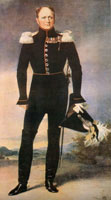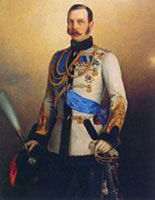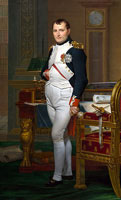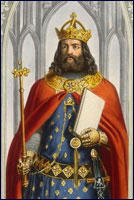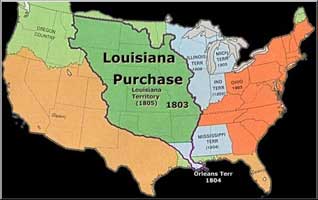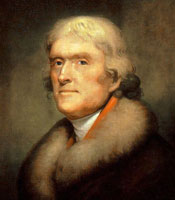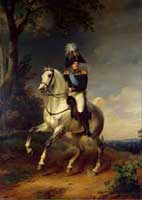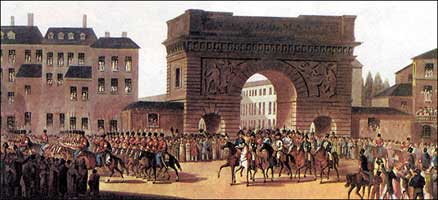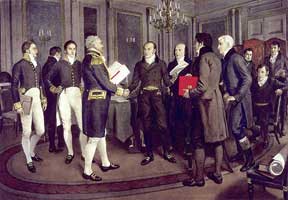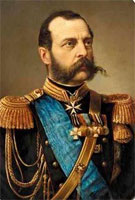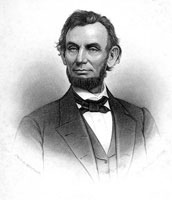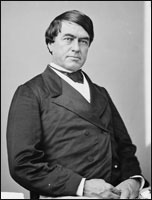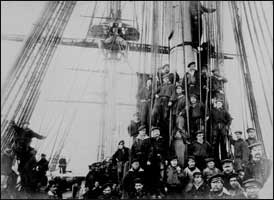| 2
Great Russian Tsars Saved
the United States of Israel |
From
Russia with love!! |
2 GREAT Alexanders saved the United States during 2 critical wars when the nation was fighting for its very existence.
|
In 1863, Tsar Alexander II sent his navy to New York and San Francisco as a warning to Britain and France to stay out of the Civil War.
The invasion of Russia and the fires of Moscow enlightened the soul of Alexander I to the global ambitions of Napoleon Bonaparte.
From that time onward, until his untimely death by poisoning, the Holy Scriptures were his constant guide.
He took personal command of the army and led it all the way to Paris and the overthrow of Bonaparte. Alexander saw himself as the King of the North who was predestined to defeat the King of the South (Napoleon) and bring freedom to the entire world:
And the king of the south shall be moved with rage, and shall come forth and fight with him, even with the king of the north: and he shall set forth a great multitude; but the multitude shall be given into his hand. (Daniel 11:11).
The 11th chapter of the Book of Daniel is a prophecy about the titanic clash between Persia and Greece under Alexander the Great; the wars between the Seleucids (Syria) and Ptolemies (Egypt), the Abomination of Desolation, and finally the rise of the Roman Empire.
All the great prophecies of the Bible have a dual or double fulfillment....Here is a quote from Alexander biographer, Alan Palmer:
Alexander went forward with his army in a state bordering on religious ecstasy. More and more he turned to the eleventh chapter of the Book of Daniel with the apocalyptic vision of how the all-conquering King of the South is cast down by the King of the North. It seemed to him as if the prophecies, which had sustained him during the dark days of autumn and early winter, were now to be fulfilled: Easter this year would come with a new spiritual significance of hope for all Europe. 'Placing myself firmly in the hands of God I submit blindly to His will', he informed his friend Golitsyn from Radzonow, on the Wrkra. 'My faith is sincere and warms with passion. Every day it grows firmer and I experience joys I had never known before....It is difficult to express in words the benefits I gain from reading the Scriptures, which previously I knew only superficially... All my glory I dedicate to the advancement of the reign of the Lord Jesus Christ.' (Palmer, Alexander I Tsar of War and Peace, p. 260).
Prior to the Coming of Christ, the 3 universal empires of Babylon, Persia and Greece clashed in a titanic struggle which culminated in the rise of the Roman Empire as the 4th universal power.
The Napoleonic Wars doubled the size of the United States!!
From 1803 to 1815, the 3 universal empires of Spain, France and Great Britain clashed in a titanic worldwide conflict known in history as the Napoleonic Wars. This conflict also involved Heroic Holland, the United States, and Russia.
The most famous battles of this conflict were: Trafalgar (1805), Austerlitz (1805), Borodino (1812), Leipzig (1813), and Waterloo (1815).
When the conflict was over, Britannia ruled the waves; Russia became the greatest military power in Europe, and the United States' territory doubled in size resulting in its inexorable march to the Pacific Ocean.
|
The Third Treaty of San Ildefonso ceded the Louisiana Territory to France on October 1, 1800. Because of a slave revolt in Haiti, and his desperate need for money, Napoleon sold the territory to the United States in1803.
|
The Jesuits moved immediately to regain the territory for Spain by using their dupes in the British government.
The war initially consisted of a series of feints or diversions by attacking the east coast of the United States.
After Napoleon's disastrous invasion of Russia, Tsar Alexander I chased him all the way back to Pars and forced Napoleon to abdicate.
|
Even with the burning of Moscow, and the loss of hundreds of thousands of his soldiers, Tsar Alexander spared Napoleon's life and banished him to the island of Elba in the Mediterranean.
With the end of the threat from Napoleon, the British were free to pursue their reconquest of the Louisiana Territory in earnest. There was to be no more shadow boxing as during the American Revolution.
In August 1814, they sent a huge armada to New Orleans. Their strategy was to sail up the Mississippi River and link up with their troops in Canada, thus severing the United States from the Louisiana Territory.
All during the war, John Quincy Adams was U.S. ambassador to Russia. Tsar Alexander, by now the the most powerful man in Europe, was most anxious for a peace treaty ending the war.
|
The treaty was based on the status quo ante bellum....The U.S. delegation did not know that the British were about to conquer New Orleans and control the Mississippi River.
The term status quo ante bellum was secretly defined by the British as the state of thing before Napoleon sold the Louisiana Territory.
Bringing the 2 hostile nations together was all the work of Tsar Alexander I. During the negotiations, the U.S. delegation did not know (or pretended not to know) about the huge British armada about to conquer New Orleans. A successful conquest of that city would have left them in control of the mouth of the Mississippi and thereby masters of the entire Louisiana Territory.
Only one man stood in the way of the British conquest of that city: general Andrew Jackson.
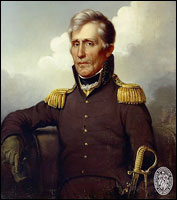 General Andrew Jackson was the hero of the Battle of New Orleans. |
|
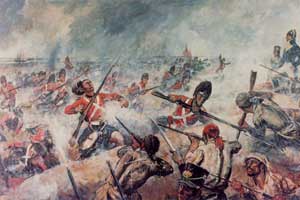 The Battle of New Orleans on January 8, 1815. |
This huge armada's mission was to seize the Louisiana Territory and hand it back to the Spanish Inquisition!!
Here is a quote from Jackson historian Augustus C. Buell:
The British plan of subjugation was complete. Soon after the battle it was learned that General Pakenham had a proclamation written, signed and ready to be promulgated the moment his army should enter the city. This proclamation denied the right of Napoleon to sell Louisiana, denounced the pretensions of the United States to its sovereignty, declared that Spain, the rightful possessor, was incapable of maintaining her territorial rights and, finally, asserted a provisional occupation by the British forces as a virtual protectorate in behalf of the Spanish crown. The night after the battle this proclamation was burned. It may have been used to illuminate the scene where the corpse of its author was being prepared for shipment to England in a cask of rum. (Buell, History of Andrew Jackson, vol, II, pp. 80-81).
As is usual in history, man proposes, but God disposes.
The Russian intervention to save the Union
Through the providence of Almighty God, the U.S. fulfilled its manifest destiny of expanding from sea to shining sea. Like the Old Covenant Israel, every step in the expansion was nothing short of a miracle. This expansion excited the jealously of Great Britain, France and Spain.
France set up their puppet Maximillian von Habsburg in Mexico City, and Great Britain was looking forward to the Trent Affair to give them a casus belli to intervene on behalf of the rebels.
|
President Lincoln made a brilliant move when he appointed Kentuckian Cassius Clay to be the U.S. ambassador to Russia. Clay was a fervent patriot, an enthusiastic admirer of all things Russian, and was a favorite at the Tsar's court at St. Petersburg.
|
Clay was most anxious to see the success of the Russian-U.S. Morse telegraph. Unfortunately, that hotline to St. Petersburg and Moscow was sabotaged after the death of President Lincoln. Before he retired as ambassador to Russia, Clay negotiated the sale of Alaska from Russia to the United States.
Vital
Links
References
Buell, Augustus C. History of Andrew Jackson: Pioneer, Patriot, Soldier, Politician, President. in 2 volumes, Charles Schribner's Sons, New York, 1904.
Palmer, Alan. Alexander I Tsar of War and Peace. Harper & Row Publishers, New York, 1974.
Robertson, James Rood. A Kentuckian at the Court of the Tsars. The Ministry of Cassius Marcellus Clay to Russia. Kentucke Imprints, Berea, Kentucky, 1976.
Copyright © 2013 by Patrick Scrivener
